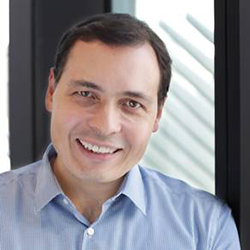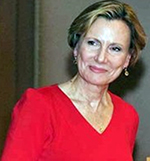

Jack Smith, Global Chief Product Officer

Jill Kelly, Chief Marketing Officer

Brian Wieser, Global President, Business Intelligence
See the current issue
of The Internationalist magazine
Find out how to sponsor an issue of Trendsetters
|
|
If you have spotted a trend or given a recent presentation on a global issue, please tell use and don't forget a photo of yourself!

To submit to Trendsetters, contact me at: linkedin.com/in/deborah-malone-ab5897,
The Internationalist group on LinkedIn:
https://www.linkedin.com/groups/2560753/or at Twitter--@DMaloneIntl
TRENDSETTERS: A New Look at the Meaning of CES through the Perspectives of GroupM
The Internationalist Trendsetters is written by Deborah Malone, founder of The Internationalist.
"Despite the overwhelming volume of new and shiny objects on display in Las Vegas, CES is not about the gadgets," says Jack Smith, Global Chief Product Officer, Investment at GroupM. "This thinking may be heretical to some electronics companies, but the best way to read CES is to look for the long-term effects of technological change on people and businesses."
He believes that over the past five years, CES has been overtaken by the less sexy-- yet much more significant-- enabling technologies which themselves have been developed over many preceding years. The resulting software and connectivity that drives interoperability between devices, access to cloud computing resources and massive data storage along with improvements in battery life are now central to new consumer experiences and service layers, even if they aren't always easy to demonstrate in a booth or a press release. He calls this "invisible revolutions."
Jack Smith also characterizes 2020 CES as "a year of competing opposites," and outlines the contradictions he found on the show floor:
- Simpler but also more complex. AI is driving simpler ways to interact with complex or cumbersome products. Intelligent assistants have made simple information retrieval easier, but they're not yet evolved enough to be invisible. AI has also made personalization easier, but the black box nature of these algorithms has made it nearly impossible to understand why certain personalization decisions are made. Robots that appear "more human" also made the rounds at CES this year, but we don't yet know how to interact with these human surrogates.
- Smarter and somehow, dumber. Companies play out their products' intelligence to its illogical conclusion. For example, autonomous vehicles have the potential to make travel safer in the long term, but this year we will see personal autonomous vehicles that remove nearly all manual control from its operator, effectively making a very smart product dumb.
- Sustainable and more disposable. Technology is resource hungry-- consuming electricity and bandwidth. Sustainability is becoming a greater requirement benefit in a resource hungry business, and we're now seeing smaller footprint personal appliances like single serving dishwashers that consume less electricity and water and generate less heat. Innovation in sustainability helps smooth inequality and distributes the benefits of technology widely, but we also saw thousands of smaller, more disposable gadgets in addition to more use of plastics in areas like indoor farms that use Keurig-like pods.
Jill Kelly, Chief Marketing Officer, USA of GroupM believes that "the future of technology lies not in the big and the bendable, the flying and shining, but it will be inspired by perhaps a nobler, preservation mission: helping humans manage and navigate their current condition, while influenced by the triple vectors of sustainable wellness, health across all generations, and individual and tribal prosperity." She calls this category of products "empathy electronics" or "human first," "pro-person products" and notes that the fastest-expanding sector at CES is health, fitness and wellness, which now takes up close to half the real estate at Tech West.
Among the "empathy electronics" making their debut were Tombot (a robot for good helping seniors with dementia), CyclePath (prompting movement in young gamers), Mateo (for body and posture analysis), and Pillo (healthcare at home).
Jill Kelly also notes that Federico Casalegno, Samsung's Chief Design Innovation Officer, best summarized CES 2020 and its focus on health & wellness when he said, "The goal isn't to add more devices and products. It's to live better with more intuitive and simplified technologies."
Brian Wieser, Global President, Business Intelligence of GroupM observes, "It is rare when a CES-related new product announcement has a ‘this will change everything' feel for the advertising industry, and this year was no exception." He points to some past product launches that were impactful for the advertising industry, such as the launch of TiVo in 1999. However, he found 2020 announcements to be much more incremental with an abundance of focus on advanced TV and applications of artificial intelligence to advertising. He explains, "Implications for advertising and marketing tied to the roll-out of 5G networks and related devices were also frequently discussed, even if the impact is far off in the future. Separately, social media networks made relatively minor announcements: Twitter said consumers would be able to customize how they view replies while Facebook announced it would allow users to exclude themselves from being targeted by specific advertisers via Custom Audiences. Brand safety continues to be a background context in these developments."
Perhaps Brian Wieser say it best when he emphasizes "incrementalism is not unimportant: industry change takes time." He further explains this point of view: "Changes to most industries take time because there are so many inter-locking elements of technology and processes and so many different companies involved in any one piece of workflow, with no one company able to change much by themselves typically. Alternatively, few companies are willing to risk blowing up their own businesses in order to cause change. But, over time, incremental changes enabled by new technologies do have an effect. In much the same way as a better product first displayed decades ago makes possible a business model that gets invented today, new transformative opportunities and future commercial revolutions will be made possible because of concepts or products introduced at CES last week."
Jack Smith, Global Chief Product Officer, Investment at GroupM
Jack Smith works with the agencies and practice specialists of GroupM, WPP's world-leading media investment group, to develop media products and services that give client companies greater advantage in market. This role enables him to deliver GroupM's data capabilities, expertise, and technology effectively through direct collaboration with clients and their agency teams. He also works across all media, including those not yet fully digital or addressable, to improve GroupM's ability to deliver personalized communications at scale. Throughout his career at WPP, Smith has been a driving force in the development of the group's capabilities in addressable (digital) media.
Jill Kelly, Chief Marketing Officer, USA of GroupM
Jill Kelly joined GroupM as U.S. CMO in June 2019. She supports GroupM's growth through her leadership of brand marketing, product marketing and business development practices. Her mandate is to communicate the benefits of the ongoing transformation and simplification of the business to external customers and internal stakeholders. She most recently served as Global CMO of Digitas. Prior roles include CMO of Publicis Spine and EVP, Global Director of Corporate Communications at Starcom.
Brian Wieser, Global President, Business Intelligence of GroupM
Brian Wieser joined GroupM's senior leadership team in February 2019 as Global President, Business Intelligence. Wieser is highly regarded in the marketing, media, advertising and technology fields. He has been called "Madison Avenue's de facto Chief Economist." In his most recent role as Senior Analyst at Pivotal Research Group, he led the firm's deep coverage of agencies, video and other digital content platforms, advertising and marketing technology, measurement companies, and more. One of the most quoted executives in the industry, he is sought after by journalists for the deep understanding he developed as an industry analyst and in earlier roles as an advertising and investment banking executive.
